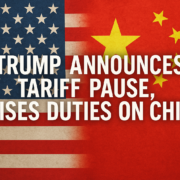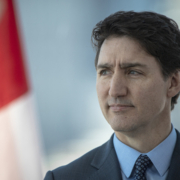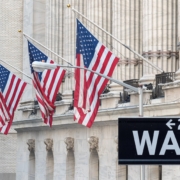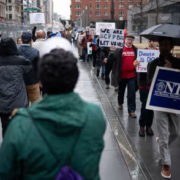Tariff Threats and Economic Uncertainty Could Slow U.S. Growth in 2025
The Economy Teeters While Politicians Play Trade War Games
It’s 2025, and here we go again. The folks in Washington, armed with their bottomless appetite for economic meddling, are threatening another round of tariffs—this time aimed at Canada, Mexico, and China. Meanwhile, the people who actually power the economy—workers, small businesses, and investors—are left bracing for impact. Despite rising wages in January, consumer spending dropped 0.2%, the biggest decline since February 2021. The message? People are feeling the squeeze, and they’re holding onto their wallets.
Will Tariffs Drive Inflation Through the Roof—Again?
Sure, the talking heads in Washington love to say they’re “protecting American jobs.” But let’s cut the nonsense—import tariffs are nothing more than hidden taxes on consumers. Prices rise, wages stagnate, and working people foot the bill. Inflation may have cooled to 2.5%, but if these new tariffs kick in, expect that number to go right back up.
History tells us how this ends. Remember the Smoot-Hawley Tariff Act of 1930? That piece of economic sabotage made the Great Depression worse, crippling global trade and deepening the financial meltdown. Yet here we are, nearly a century later, flirting with the same kind of short-sighted, politically motivated economic experiments.
Economic Growth? More Like Economic Slowdown
While the Federal Reserve Bank of Atlanta tries to sound optimistic, their 1.5% GDP contraction forecast for Q1 2025 speaks volumes. Business investment is drying up as companies stall expansion plans, afraid of what Washington will do next.
The last time we saw this kind of trade tension—the U.S.-China trade war of 2018—it rattled markets, delayed corporate investments, and put financial stability on shaky ground. Now, Washington is rolling the dice again, as if history hasn’t already made its position clear.
Federal Layoffs and the Unemployment Domino Effect
As if tariffs weren’t enough, the government is also slashing the federal workforce to supposedly “reduce the deficit.” We’ve seen this trick before—public sector layoffs in 2013’s federal budget sequestration led to weaker consumer spending, rattled confidence, and slowed down the economy. Cutting jobs in an already shaky environment? Brilliant strategy—if the goal is to stoke a recession.
Will the Federal Reserve Save the Day?
The big question: Will Jerome Powell and the Fed step in? Investors have been banking on interest rate cuts in 2025, but if tariffs reignite inflation, those rate cuts might never come. And if the Fed gets stuck between rising prices and an economic slowdown, buckle up—markets will feel the turbulence.
What This Means for Your Wallet
- Higher Prices on Imports – Electronics, cars, household goods—expect costs to climb as tariffs hit manufacturers.
- Economic Growth Stalls – The 1.5% GDP contraction is just the beginning if companies keep pulling back on spending.
- More Job Uncertainty – Federal layoffs could lead to higher unemployment and weaker consumer demand.
- Interest Rate Wild Cards – Investors hoping for Fed relief may be in for a rude awakening.
- Inflation Could Reignite – If Washington goes full throttle on tariffs, expect price hikes across the board.
Bottom Line: This is a Washington-Inflicted Mess
Let’s be clear—tariffs don’t help the American worker. They’re a sneaky tax, dressed up as “economic policy,” and they’ve historically led to higher consumer prices, lost jobs, and slower growth. While Wall Street strategists and Fed policymakers try to make sense of it all, the real losers are everyday Americans who will see rising costs, slower job growth, and shrinking spending power.
How to Protect Yourself from Washington’s Trade War Fallout:
- Diversify Your Investments – Consider sectors less exposed to international trade disputes. Domestic service industries might be a safer bet.
- Monitor the Federal Reserve Closely – If the Fed holds off on rate cuts, the markets could shift quickly.
- Prepare for Price Increases – Expect inflationary pressures in technology, auto, and retail sectors. Budget accordingly.
Ensuring a Human Perspective
The next few months will determine whether politicians backtrack or double down—and whether consumers, investors, and workers will bear the brunt of their decisions.
Stay informed, stay skeptical, and don’t let Washington’s economic experiment catch you off guard.









Leave a Reply
Want to join the discussion?Feel free to contribute!